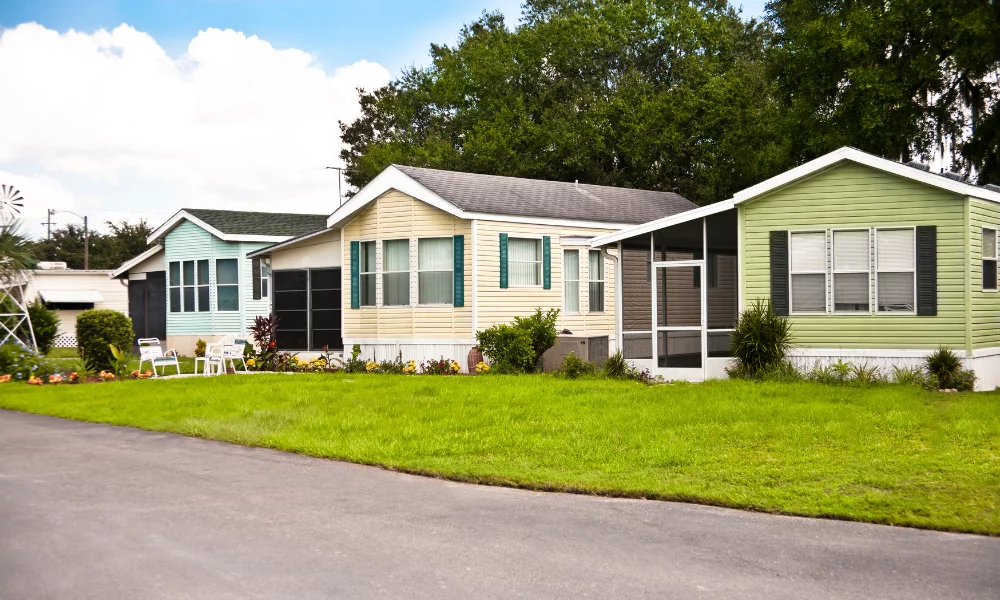A short summary
You may have heard of manufactured homes before, but if you’re considering whether you should invest in one or not, you’ll need to know more. We’ll outline the ins and outs of how they work, what the financing options are, and whether manufactured homes are a good investment or not.
Skip To
Building a house can become a very expensive undertaking which makes it impossible for a number of people to afford this in the current real estate market. Manufactured homes, which were also known as mobile homes previously, are an important affordable housing option for many people. Manufactured homes can be customized to suit people’s financial situation and lifestyle needs. These are a cheaper alternative to traditional homes, which can be a lot more costly, and less customizable.
Let’s take a closer look at manufactured homes, the pros and cons, and the difference between mobile homes and manufactured homes.
What are manufactured homes?
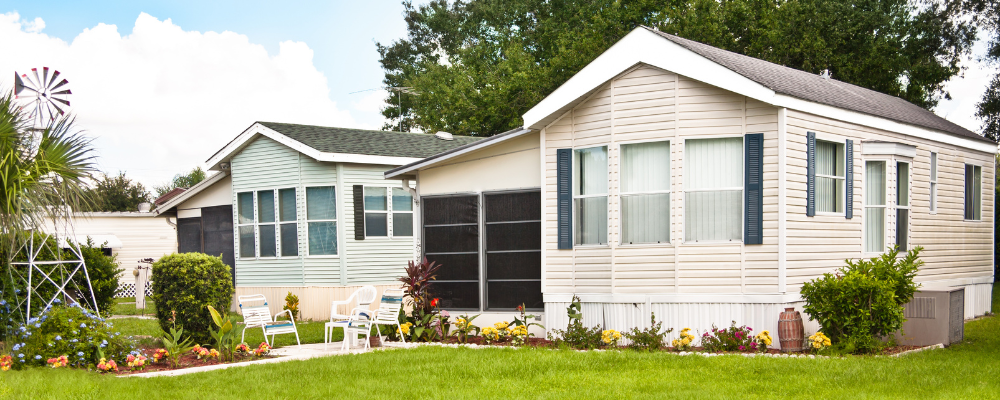
Manufactured homes used to be called mobile homes, however they have vastly improved since then. In essence, manufactured homes are factory-built homes that are delivered already assembled, and then affixed on a piece of land. They are a good option for people who are looking for an affordable way to buy a home, without unnecessary bells and whistles.
Manufactured homes are prefabricated and there is a standardized way that they are constructed. They are then installed in a more permanent manner once they have been delivered to the property, using concrete blocks, metal piers or other materials. However, manufactured homes don’t have a foundation that is the same as a traditional home would have.
Manufactured homes are made on an assembly line where each section is put together in various phases. These homes can be assembled in as little as a few days, or if the home has more customizations, then a few weeks. Once the home is complete, it is loaded onto a truck and delivered to the property where it will be affixed.
Manufactured homes will typically have many of the same features as a traditional home build. These include fiberglass insulation, drywalls, PVC plumbing and more. Homeowners have multiple options to choose from when it comes to the home’s floorplan, trims, and features such as countertops. This customization makes manufactured homes an interesting choice.
Pros and cons of manufactured housing
As manufactured housing grows in popularity, it’s important to consider the benefits and drawbacks, before you can decide if they’re the right solution for your needs.
Pros of manufactured housing
- Affordability: Manufactured housing is significantly cheaper than traditional new homes. In some cases, a manufactured home can even cost half the amount of a new home build. For this reason, they are extremely attractive to buyers looking for an affordable housing solution.
- Easy maintenance: Due to the fact that manufactured homes are made up of standardized parts, this means that these parts can be replaced under warranty. Which makes maintaining a manufactured home easier and more affordable than a regular home.
- Faster build: One of the main features that set manufactured homes apart is that they are fast to build. This time saving element can be a huge benefit for home buyers, as manufactured housing can be constructed in a shorter time with stockpiled materials and streamlined construction processes.
- Customization: A manufactured home can be personalized to a large degree, with various features and finishes on offer to suit different styles.
- Reliable quality: There is a set of standards that manufactured homes are built according to. This, along with the fact that they have to be built to code, means that homeowners can trust the quality and safety of these homes.
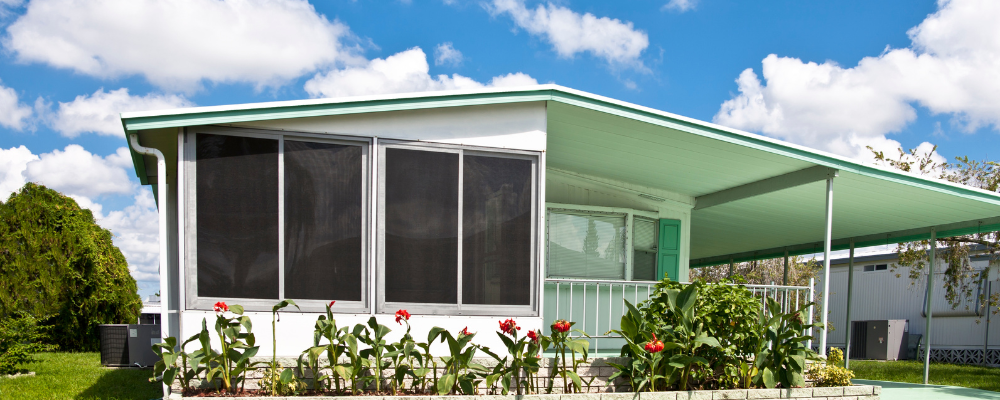
Cons of manufactured housing
- Fewer financing options: There is a limited selection for home buyers looking to finance their manufactured home purchase. Add to this the fact that some of these options can be quite pricey, and this can turn into a deterrent for some buyers.
- Hard to customize later: While manufactured home buyers can personalize their home initially, it can be difficult to make additions or upgrades later on. Once the home is assembled, there are a limited number of features that can be changed and adding on modules is possible however they may be quite standardized.
- Location limitations: Manufactured homes aren’t available everywhere, so this can pose a problem for home buyers in certain areas.
- Acquiring land: Manufactured homes require land to be affixed, which means that home buyers will need to purchase land and make sure that the manufactured home can be affixed on it. This is an extra cost to be factored in, and it’s important to remember that the land choice may be limited due to the manufactured home installation.
Investing in manufactured homes - What you need to know
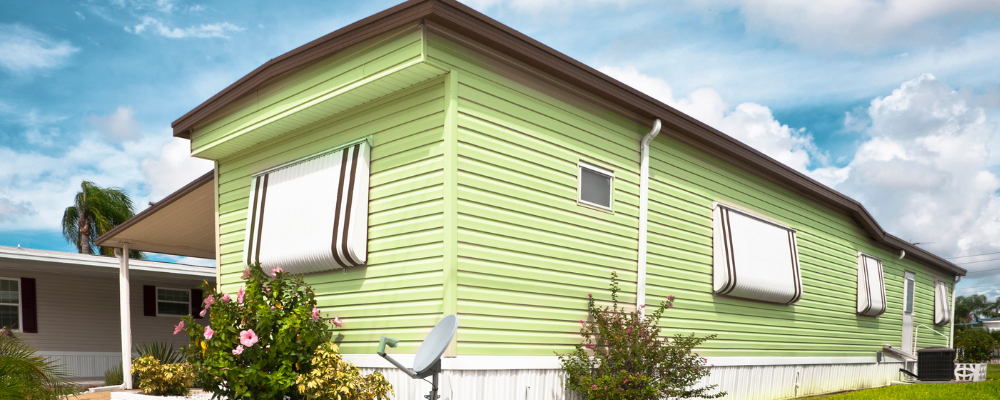
If you’re thinking about investing in a manufactured home, we’ve got some advice for you.
- Local zoning restrictions
An important factor to consider is the local zoning restrictions in the area where the home will be affixed. There can be restrictions on land use in some areas which could result in a problem with installing a manufactured home. When you’re buying land, check the restrictions for the land first and make sure that you can in fact affix a manufactured home.
- Evaluating land
Choosing a plot of land for a manufactured home needs to be done carefully. The land should have the right soil composition, be easy to access, and the less work that needs to be done to it before the home can be affixed, the better.
- Financing options
Conventional mortgages can be used for manufactured home purchases provided that they are at least 400 square feet in size. There are 2 conventional loan options to consider:
- MH Advantage program: This is provided by Fannie Mae and therefore an FHA backed loan, with a down payment of just 3%.
- CHOICEhome program: This is provided by Freddie Mac, to buyers with good credit and with a down payment of as little as 5%.
- Government backed loans: The US Department of Veterans Affairs (VA) offers a loan to purchase manufactured homes provided they are considered real property.
- Chattel loans: These loans use the home as collateral and typically require a 5% down payment to qualify.
- Owner financing: Purchasing the manufactured home through the owner or dealer themselves using their financing is also an option. Even if you are purchasing a manufactured home from a private seller, they may offer you a loan as well.
- Manufactured home costs
Manufactured homes cost different amounts, depending on the size of the home. While a traditional home can cost anywhere between $150 and $400 per square foot to build, manufactured homes often cost around $100 per square foot, according to HomeAdvisor. To work out the cost of a manufactured home you’ll need to factor in:
- Whether you need to purchase land for the home to be installed on. This is a major extra cost.
- The features and fixtures that you choose. These can add up quickly and the home can become more expensive. For example, hardwood floors versus carpet can be a big price difference.
- Whether you want to affix the home permanently or not. This process can add to your costs significantly with the installation price, and building codes will need to be adhered to.
Manufactured homes vs mobile homes - What's the difference
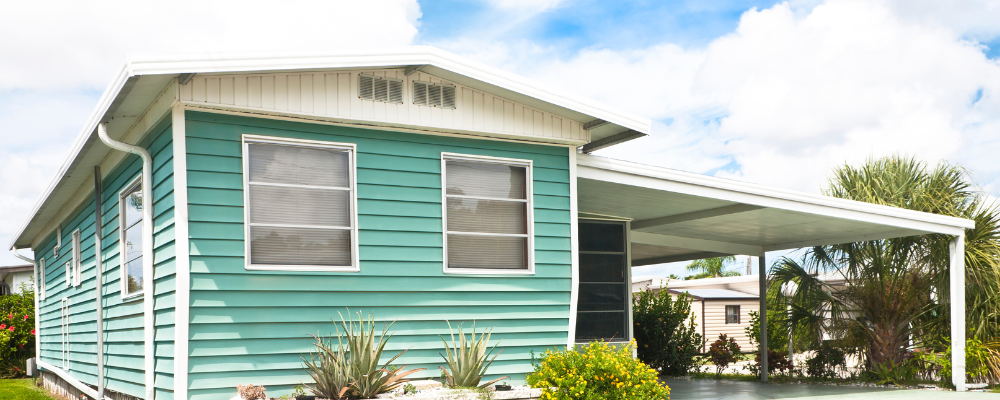
Manufactured homes are sometimes called mobile homes because they are essentially mobile, meaning they can be transported by a trailer hitch and axles. Manufactured homes are classified as a vehicle for both zoning and tax purposes, due to the portable nature of them.
While both manufactured homes and mobile homes are regulated by the Department of Housing and Urban Development (HUD), the two aren’t exactly the same. The date that the home was built is essentially the main differentiator between the two types of homes. Homes that were factory-built before 15 June 1976 are referred to as mobile homes. Any homes that were factory-built after that date are considered manufactured homes.
Another differentiator is that manufactured homes can be fixed permanently and are solidly built, while mobile homes are meant to remain mobile in a mobile home park and can be cheaper.
Do manufactured homes increase in value?
Unfortunately, manufactured homes can depreciate in value over time, however this isn’t always the case. The value of a manufactured home rises or falls over time based on a number of factors, so it’s difficult to a general rule of them as to whether they will appreciate or not. These factors include location, the age of the home, as well as the condition of the home. Typically, manufactured homes don’t appreciate in value the same way traditional homes do.
Final thoughts: Should you invest in manufactured homes?
Manufactured homes can be a good forever home option if you want to get more bang for your buck in today’s housing market, with a fast and efficient build. The land will need to be purchased, however, so this is important to bear in mind. The land purchase can take a little longer, and cost extra, so this is an influential factor in your decision.
For real estate investors looking for an investment property however, this may not be the best solution as appreciation cannot be guaranteed, resale value may not be higher than purchase value and making home improvements can be tricky.
While financing options may be limited, purchasing a manufactured home can be a good solution for people who are downsizing or retiring. A manufactured home is an easy and efficient way to get a home within a few weeks, provided that the land is available for it. The installation is also quick, and this allows homeowners to move in virtually straight away.
